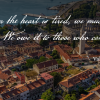
Published: April 15, 2003
View the Original Newsletter: Iskra-120.pdf
About This Issue
Iskra No. 120 finds Valentina Krčmar in a moment of contemplation — caught between exhaustion and conviction. The spring of 2003 brings both renewed hope and persistent tension within the Croatian-Canadian community. The disputes surrounding the Croatian Credit Union (HKZ) remain unresolved, yet Valentina’s focus is broader and more philosophical.
This issue explores the meaning of truth, the fragility of trust, and the irreplaceable role of words in preserving memory. Valentina speaks openly about the loneliness that comes with defending one’s principles, but she also finds solace in the letters of support pouring in from across Canada and Croatia. Through poetry, cultural reflection, and health education, the edition once again balances the spiritual and the practical — reminding readers that, even in conflict, dignity endures.
Editorial: “The Burden and Blessing of the Pen”
Valentina opens with a meditation on responsibility — what it means to write truthfully when others would rather forget. “There are moments,” she confides, “when I wish I could remain silent. But to be silent would mean betraying what I know to be right.”
She describes the emotional toll of public scrutiny and misinformation, particularly those who twist her words or accuse Iskra of bias. Her response is calm but firm: “Those who write only what others want to hear create fog, not light.”
Amid the ongoing HKZ scandal, Valentina clarifies that Iskra’s mission is not vengeance but clarity. She insists that journalism, especially within the diaspora, must remain a mirror — reflecting both the good and the uncomfortable truths that define a community’s growth.
The editorial closes with a quiet affirmation of faith. “Everything passes,” she writes, “but only the truth remains — sometimes buried, but never dead.”
Community News: “Acts of Faith and Renewal”
The heart of the community beats steadily throughout this issue. Valentina reports on Lenten celebrations, parish anniversaries, and concerts that uplift spirits amid uneasy times.
Highlights include:
-
A concert at Župa Hrvatskih Mučenika, featuring children’s choirs and youth poetry that capture the innocence and resilience of the next generation.
-
The annual charity luncheon by Fond Slavonija, which gathered donations for families in Slavonia and Herzegovina still rebuilding after the war.
-
The Croatian Women’s Club of Mississauga, whose Easter drive for seniors is described as “a gesture of quiet love that speaks louder than politics.”
Valentina praises these community builders, calling them “the true currency of Croatian pride abroad.”
National & Political News: “Croatia Between Promises and Patience”
Croatia in early 2003 is a nation waiting — for reforms, for progress, for recognition. Valentina summarizes key developments in the European Union accession process, including cooperation with The Hague Tribunal and debates on constitutional amendments.
A reprinted commentary from Vjesnik reflects growing frustration with bureaucracy and corruption, while an accompanying piece from Večernji list reminds readers that “faith in democracy is tested most when patience runs thin.”
Valentina observes that Croatians abroad must stay informed, not disillusioned. “If we do not understand the storm,” she writes, “we cannot appreciate the calm that follows.”
Culture & Heritage
The cultural section of this issue is both nostalgic and celebratory. Valentina features a profile of Miroslav Krleža, one of Croatia’s most complex literary figures, describing him as “a man who held a mirror to his people, even when they didn’t like what they saw.”
There is also a short essay by Ankica Sertić on Croatian proverbs and their enduring moral lessons, alongside a lighthearted feature on Easter traditions in Dalmatia, from the painting of eggs (pisanice) to the blessing of olive branches.
A section titled “U spomen na naše pjesnike” (“In Memory of Our Poets”) reprints two reflective poems that meditate on mortality and belonging — timeless themes in Valentina’s work.
Health & Wellness
Dr. Darko Desaty continues his educational column with a focus on thyroid disorders, emphasizing symptoms that often go unnoticed, especially in women. He outlines both traditional and holistic treatment methods, reminding readers to “treat the cause, not only the symptom.”
A second health piece discusses stress management, connecting emotional wellbeing to physical health — a theme that mirrors Valentina’s own reflections on resilience.
In Memoriam
Valentina pays tribute to several respected members of the Croatian community:
-
Dr. Branko Sertić, remembered as a physician, scholar, and devoted patriot.
-
Kata Barišić, a parish volunteer whose “hands were never idle, even in her final days.”
These memorials, though brief, are deeply personal — written in Valentina’s familiar tone of warmth and reverence.
Everyday Life & Humor
The final pages feature a dose of wit and humanity. Anecdotes about village gossip, family life, and aging fill the humor section. One particularly charming story — “Kako je baka prevarila televizor” (“How Grandma Outsmarted the Television”) — earned special praise from readers for its simple joy and gentle irony.
Closing Reflection
Valentina ends on a note of perseverance. She admits that Iskra’s future depends on both financial support and moral encouragement but promises to continue “as long as there is one reader who believes truth is worth printing.”
Her final line resonates like a quiet vow:
“I will not put down my pen. Even if it trembles, it will not betray me.”




